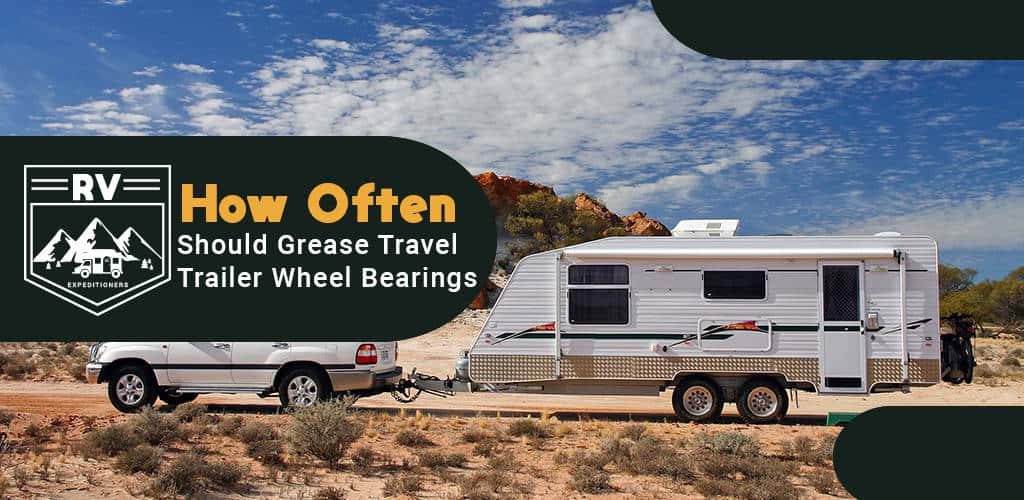Summer is here, which means that everyone is getting their travel trailers ready for everything from boating, work, and lawn care to summer road trips and family vacations. One thing that is important in going to this season is making sure that your travel trailer is prepped for hitting the road.
Today, we are going to take a look at greasing your travel trailer wheel bearings, why it’s important, and how often you should be lubricating your bearings.
Why Do You Need to Grease Your Wheel Bearings?
This is a question that we get quite a bit. What’s important to keep in mind is that for the longevity and performance of your trailer, you need to be greasing your wheel bearings periodically. If you do not, this can inevitably lead to your trailer breaking down prematurely, costing you more in time, money, and maintenance in the future. Greasing your wheel bearings regularly will make sure that you get a long, functional life out of your travel trailer.
If your travel trailer stays parked for long periods of time, condensation can start to build up inside of your travel trailer’s wheel bearings. With enough condensation for a long enough period of time and your bearings will begin to rust. Rust increases friction and prevents the bearing from doing its job properly. This can lead to the total failure of your bearing, and leave you stuck on the side of the road with a blown-out trailer.
When to Grease Your Bearings?
The maintenance of the wheel bearing usually depends on the kind of trailer you are using. You also have to consider:
The average load weight.
The wheel size.
Typically, you should plan on performing maintenance on your bearings and greasing them at least once per year. However, there are other considerations that will affect the frequency you should plan on greasing the wheel bearings on your travel trailer. How often you are hauling and the size of your wheels are all going to affect the frequency at which you clean and grease your bearings.
The Time Frame for Greasing Your Travel Trailer Bearings
The frequency at which you clean and grease your wheel bearings depends on the wheel size, type of trailer you have and the average weight of the loads you are carrying. Some manufacturers recommend inspecting and greasing an RV's wheel bearings once during every season. Another rule of thumb is that you should grease them, at minimum, every 10,000 miles. On the other hand, boat trailers with small wheels require repacking every 2,000 miles. Generally, the smaller the tire, the faster the wheels spin, which puts more relative stress on the bearings than larger tires would. The frequency at which you grease your bearings can also be determined by how the trailer is used, how often it is used, and where it will be traveling in terms of distance, temperature, and geography.
Considerations
In 2008, the cost of having this job performed by a professional mechanic was approximately $125 per axle, based on average pricing obtained from three different RV repair shops in southern California.
However, this maintenance is significantly less expensive if you want to do it on your own. Trailer owners who attempt this job at home will spend less than $100 in parts. The procedure calls for basic mechanical aptitude, and only requires high-temperature grease, rags, a trailer wheel jack, a torque wrench and a hammer. A bearing packer makes the job cleaner but is not necessary for the job.
Identification
Wheel bearing design has been the same for over 50 years, and greasing them is a simple process. Keep in mind that before you attempt this at home, it is a good idea to have a service manual for your trailer that includes instructions for the procedure. The wheels must be properly torqued as well. Obtain a proper trailer jack, and block all tires on the opposite side to ensure you are safe while underneath the trailer.
Warning
You should perform this type of maintenance if you have hauled very heavy loads or have been driving with your trailer off-road. If you have towed your travel trailer through water that covered the axles, you should check your wheels, bearings and perform maintenance.
Some manufacturers forget to grease the wheel bearings prior to delivery to the dealer. You can test the new trailer wheel bearings for excessive friction. All you need to do is touch the tire after it has been in use. If you feel that the surface of the tire is hot, that could indicate inadequate improper lubrication.
Conclusion
You should never use two different kinds of grease thickeners together, at the same time. Do not mix these together. Axles use a thickener that is made of a lithium complex. When you mix the grease with polyuria soap, clay, calcium, or barium, you may create some adverse effects. The grease can actually harden or separate. It can also become acidic, thereby, posing damage and other hazards to your bearings.

